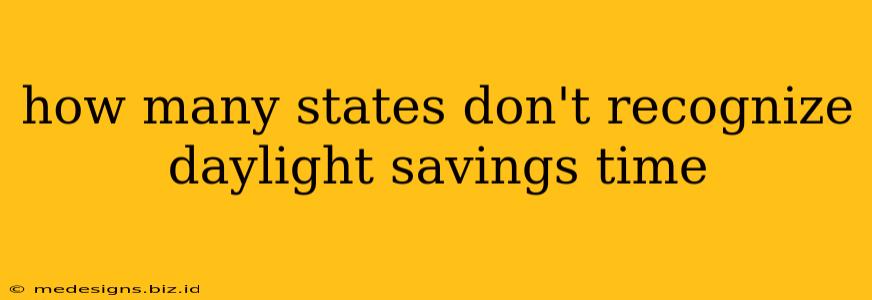How Many States Don't Recognize Daylight Saving Time?
Daylight Saving Time (DST), that annual clock-shifting ritual, is a source of both convenience and consternation. While most of the United States observes DST, a growing number of people and even some states are questioning its continued relevance. So, the burning question is: how many states don't recognize Daylight Saving Time?
The simple answer is two. As of 2024, Arizona and Hawaii are the only two states that do not observe Daylight Saving Time.
Let's delve a little deeper into why:
Arizona's Stand Against DST
Arizona, with the exception of the Navajo Nation, remains on Mountain Standard Time (MST) year-round. This decision stems from a variety of factors, including:
- Energy Savings Debate: While DST was initially implemented to conserve energy, studies have yielded mixed results on its actual effectiveness. Arizona's experience with year-round MST suggests that energy savings aren't significantly impacted.
- Tourism and Business: Maintaining a consistent time zone simplifies scheduling for businesses and tourists, particularly those traveling across state lines. A year-round time zone avoids the confusion and potential disruption caused by the twice-yearly time changes.
- Public Opinion: A strong preference exists within Arizona for maintaining MST. The consistent time zone has become part of the state's identity and way of life.
Hawaii's Perpetual Standard Time
Hawaii, situated in a different time zone altogether, has never adopted DST. The reasons are similar to Arizona's:
- Geographical Location: Hawaii's unique geographical location means that its daylight hours align differently than the continental U.S. DST is less impactful and less beneficial.
- Tourism Importance: Like Arizona, a consistent time zone aids the tourism industry in Hawaii. The convenience for both local residents and visitors is a significant factor.
- Established Practice: The consistent use of Hawaii Standard Time is deeply ingrained, and changing would disrupt established routines and schedules.
The Ongoing Debate About Daylight Saving Time
The question of whether or not to observe DST is a recurring topic of debate at both the state and national levels. Arguments for keeping DST often center on:
- Extended Daylight Hours: More daylight in the evenings is seen as beneficial for recreational activities and potentially reduces energy consumption.
- Economic Benefits: Some argue that extended daylight hours boost retail sales and other economic activity.
Conversely, arguments against DST highlight:
- Health Impacts: The disruption to the body's natural circadian rhythm is linked to potential health problems, including sleep disorders.
- Inconvenience: The twice-yearly time changes can be disruptive to schedules, especially for those working irregular hours or traveling across time zones.
- Lack of Clear Energy Savings: Many studies question the actual energy savings achieved by DST.
The Future of DST: The debate about Daylight Saving Time continues. While only Arizona and Hawaii currently don't observe it, the possibility of further changes or a nationwide shift remains a topic of ongoing discussion.
This article covers the states that don't observe daylight saving time, offering valuable insight into the ongoing debate surrounding its relevance and impact. Whether you're a proponent or opponent of DST, understanding the perspectives of states that have opted out provides crucial context for the conversation.
